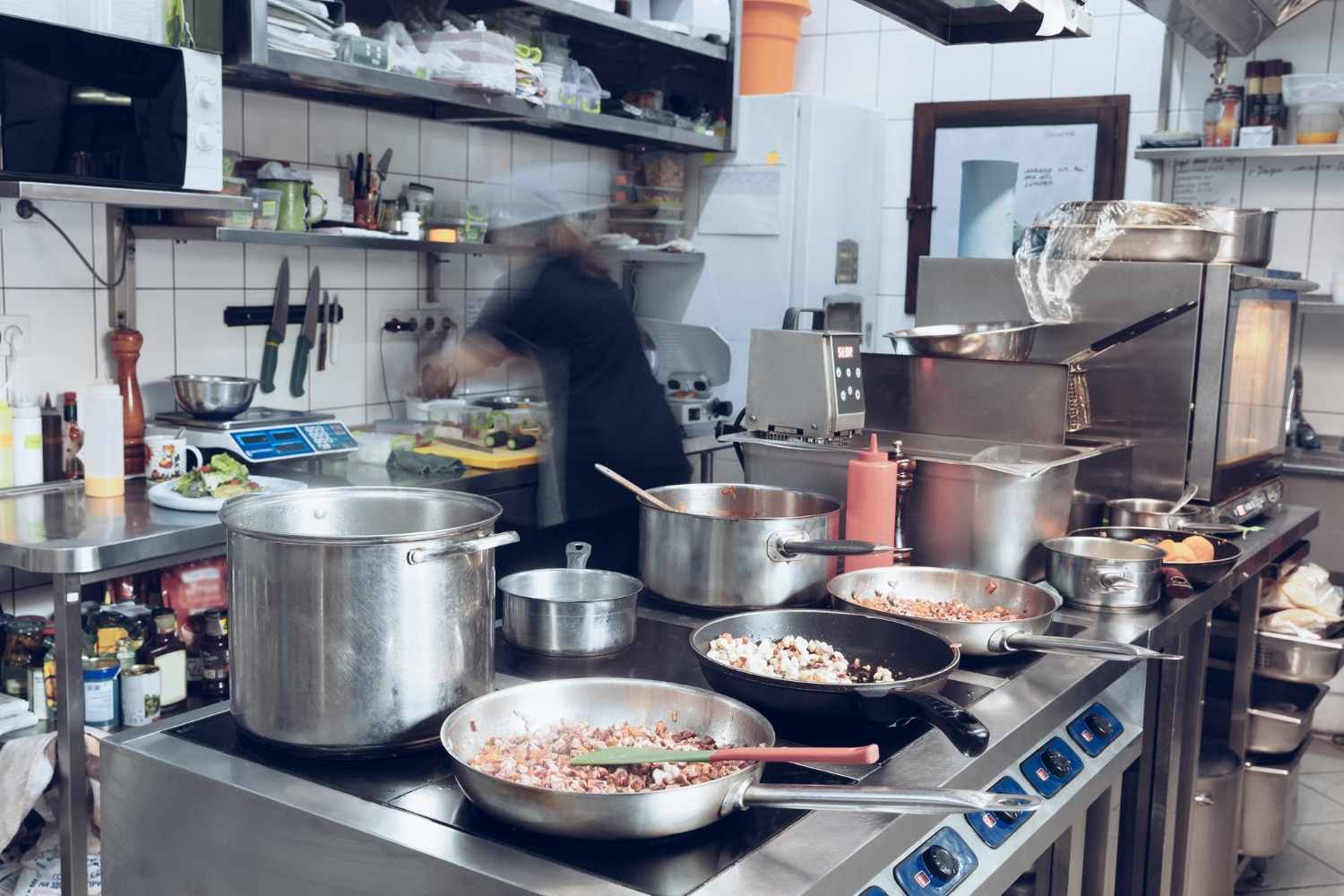
In the fast-paced world of baking, staying competitive and meeting the ever-increasing consumer demands is essential. The global Bakery Processing Equipment Market has undergone a significant transformation over the years, thanks to the integration of automation technologies.
Automation has brought about substantial changes in how bakeries operate, from improving production efficiency to enhancing product consistency and safety. In this article, we will explore the various ways automation has impacted bakery processing, the benefits it offers, and the challenges that come with it.
What is Bakery Automation?
Bakery automation refers to the use of automated systems and machinery to streamline various processes in the production of baked goods. These processes can include mixing, kneading, baking, packaging, and even distribution. Automation involves the integration of robotics, sensors, conveyor belts, and computer-controlled systems that work in unison to increase productivity, improve accuracy, and reduce the need for manual labour.
Enhancing Production Efficiency with Automation
One of the most significant impacts of automation on bakery processing is its ability to boost production efficiency. Manual labour in a bakery environment can be time-consuming, especially when preparing large quantities of products. By introducing automated systems, bakeries can achieve consistent results at a faster pace.
Automation allows for tasks like dough mixing, shaping, and proofing to be completed more quickly and with greater precision. Machines can perform repetitive tasks without fatigue, which means that production can continue uninterrupted over extended periods. This efficiency not only helps meet the growing demand for baked goods but also reduces operational costs by minimizing labour requirements and waste.
Moreover, automated systems in bakeries can monitor and control variables like temperature, humidity, and mixing times, ensuring that the quality of the product remains consistent from batch to batch. For bakeries that produce a variety of products, automation makes it easier to switch between recipes and production lines, further enhancing overall efficiency.
Improving Product Consistency and Quality
Product consistency is crucial in the bakery industry, where customers expect the same taste, texture, and appearance each time they purchase a product. Automation plays a key role in ensuring uniformity in the final product. Machines and robotic systems can measure ingredients with precise accuracy, ensuring the correct proportions for each batch.
Additionally, automated dough sheeters, mixers, and ovens help maintain consistency in texture and baking times. Unlike manual methods, which may lead to human error or variations in the handling of ingredients, automation eliminates these inconsistencies. Automated systems can also monitor the baking process in real-time, making adjustments as needed to avoid overcooking or undercooking.
As a result, bakeries can deliver products that meet customer expectations consistently. For large-scale bakeries that produce hundreds or thousands of loaves of bread or other baked goods daily, maintaining this level of quality is essential for customer loyalty and brand reputation.
Reducing Labour Costs and Improving Worker Safety
While automation brings about many benefits for the bakery, one of its most notable impacts is on labour. With automated systems handling repetitive or physically demanding tasks, bakeries can reduce their reliance on manual labour, which helps to lower labour costs. Employees can be reassigned to more complex tasks that require human intervention, such as overseeing the production process or packaging, instead of performing monotonous activities.
Moreover, automation helps improve worker safety by reducing the risk of injuries associated with manual labour. Tasks such as lifting heavy ingredients, handling hot ovens, or working with sharp instruments can be hazardous to workers. Automation removes the human element from these high-risk tasks, reducing the likelihood of workplace accidents and improving overall safety standards.
In addition to safety improvements, automation can also reduce the physical strain on workers, leading to fewer work-related injuries and fatigue. This, in turn, contributes to better employee satisfaction and retention rates.
Enhancing Product Customization and Innovation
Automation has also opened up new possibilities for product innovation and customization. As consumer preferences continue to evolve, bakeries must adapt to meet changing demands. Automation makes it easier for bakeries to experiment with new recipes, textures, and shapes, which can help them stand out in a competitive market.
For instance, automated machines can handle the production of custom-shaped cookies, cakes, or pastries, allowing bakeries to cater to special occasions such as weddings, holidays, or corporate events. With the ability to produce highly customized items, bakeries can offer a wider variety of products and target specific niches within the market.
Automation also plays a role in reducing time-to-market for new products. Since automated systems are more efficient and precise than manual labor, bakery operators can quickly adjust their production lines to test new recipes and bring innovative products to market faster.
Meeting Food Safety and Hygiene Standards
Food safety and hygiene are paramount in the bakery industry. Automation contributes significantly to ensuring that baked goods are produced under sanitary conditions and meet all regulatory requirements. Automated systems are designed to operate in controlled environments, where they minimize human contact with food products.
For example, automated mixers, ovens, and packaging machines reduce the chances of contamination by limiting the number of times the product is handled. Additionally, automated cleaning systems can be integrated into the production process, ensuring that equipment remains clean and hygienic without relying on manual labor.
Furthermore, automated systems can record and track key production data, such as temperature, humidity, and ingredient usage. This data can be used to monitor compliance with food safety standards and provide traceability in case of a product recall. Automation thus plays a critical role in protecting both consumers and bakery businesses.
Sustainability Benefits of Automation
As sustainability becomes increasingly important to consumers and businesses alike, automation in the bakery industry can play a key role in reducing waste and improving resource efficiency. Automated systems are designed to optimize ingredient usage, minimizing the amount of raw material wasted during production.
In addition, automation can help bakeries reduce energy consumption. Modern automated ovens and mixers are energy-efficient, consuming less power compared to traditional methods. This reduction in energy use not only lowers operating costs but also reduces the bakery's environmental footprint.
Automation can also help bakeries better manage their supply chain, ensuring that ingredients are ordered and used efficiently. By optimizing production schedules and reducing waste, bakeries can lower their carbon footprint and contribute to more sustainable food production practices.
Challenges of Implementing Automation in Bakery Processing
While the benefits of automation are clear, there are challenges associated with its implementation. One of the main obstacles is the upfront cost of acquiring automated systems. For small and medium-sized bakeries, the initial investment in equipment, training, and integration can be significant. However, over time, the long-term savings in labor and operational costs can offset these initial expenses.
Another challenge is the need for skilled workers to operate and maintain automated systems. Automation requires a certain level of technical expertise, and bakeries may need to invest in training their employees to handle the new technology. This can require time and resources, which may be a barrier for some businesses.
Additionally, there is the risk of over-reliance on automation, which could lead to reduced flexibility in production. In some cases, bakeries may find it difficult to quickly adapt to unexpected changes in demand or custom orders without human intervention.
Conclusion
The impact of automation on bakery processing has been profound, driving greater efficiency, consistency, and innovation in the industry. With the ability to reduce labor costs, improve product quality, and enhance food safety, automation offers bakeries numerous advantages in a competitive market. However, there are challenges to consider, including high upfront costs and the need for skilled labor to manage the technology.
As bakeries continue to embrace automation, it is clear that the industry will evolve, with technology playing an increasingly vital role in meeting consumer demands and shaping the future of baked goods production. Those bakeries that successfully integrate automation into their operations will be better positioned to thrive in an increasingly automated and fast-paced world.











Write a comment ...